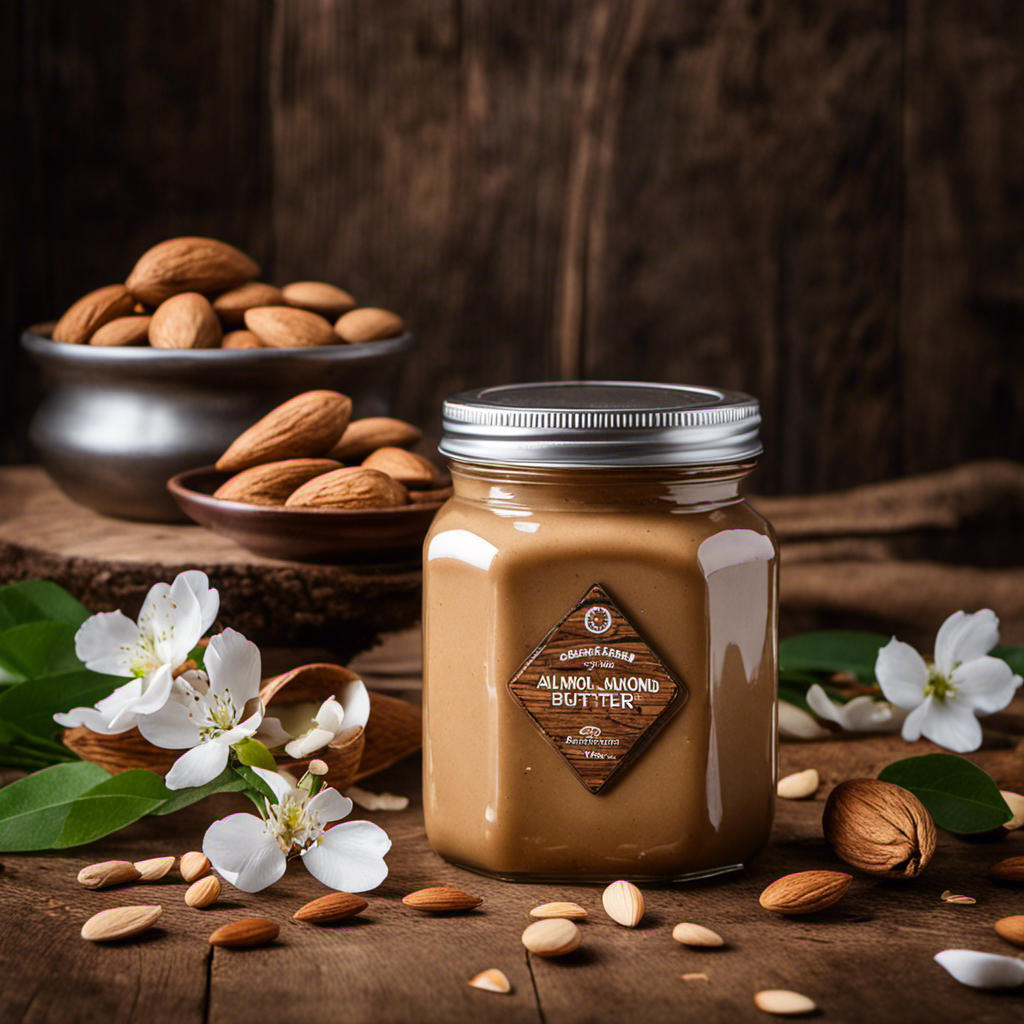Hello there! Have you ever been curious about the shelf life of almond butter? I have some insights to share with you on that topic.
In this article, we’ll explore the shelf life of almond butter, the factors that affect its longevity, and some helpful storage tips to keep it fresh.
We’ll also discuss the signs of almond butter going bad and how to properly seal those jars.
Plus, we’ll delve into the expiration dates of unopened and homemade almond butter.
So, let’s dive in and discover how to extend the lifespan of this delicious spread!
Key Takeaways
- The shelf life of almond butter can vary depending on factors such as quality, processing, and storage conditions.
- Cool and dry storage conditions can extend the shelf life of almond butter, while warm and humid conditions can shorten it.
- Signs of spoilage in almond butter include a rancid smell, strange texture, or mold growth.
- Temperature changes can affect the texture and consistency of almond butter, with high temperatures causing oil separation and runny texture, and freezing making it hard and difficult to spread.
Shelf Life of Almond Butter
How long does almond butter last in your pantry? The shelf life of almond butter can vary depending on several factors affecting spoilage. One of the main factors is the quality of the almond butter itself. If the almond butter is made with high-quality ingredients and processed properly, it can last longer.
Another factor is the storage conditions. To optimize the shelf life of almond butter, it should be stored in a cool, dry place away from direct sunlight. Additionally, it is important to keep the almond butter tightly sealed to prevent oxidation and moisture absorption.
Factors Affecting Almond Butter’s Longevity
When it comes to the longevity of almond butter, storage conditions play a crucial role. The impact of storage conditions on almond butter can determine its shelf life and quality.
It is important to be aware of the signs of spoilage and how temperature changes can affect the overall stability of almond butter.
Storage Conditions Impact
To ensure your almond butter lasts as long as possible, you should store it in a cool, dry place. Proper storage conditions play a significant role in the shelf stability and flavor of almond butter. Exposure to heat, moisture, and light can accelerate the oxidation process, causing the butter to spoil faster and lose its natural taste. By keeping it in a cool and dry environment, you can extend its shelf life and preserve its flavor for a longer period.
Here is a table outlining the impact of different storage conditions on almond butter:
| Storage Condition | Shelf Stability | Impact on Flavor |
|---|---|---|
| Cool and dry place | Extended shelf life | Preserves natural taste |
| Warm and humid place | Shortened shelf life | May develop rancid flavor |
| Direct sunlight | Accelerated spoilage | Loss of flavor and quality |
Spoilage Signs to Watch
By being aware of spoilage signs, you can determine if your almond butter has gone bad. Signs of spoilage include a rancid smell, strange texture, or mold growth.
When storing almond butter, it is important to follow proper techniques to preserve its freshness. Keep it tightly sealed in a cool and dry place, away from direct sunlight. Refrigeration can help extend its shelf life, but it may cause the almond butter to harden. To soften it, simply let it sit at room temperature for a few minutes before use.
Now that you know the signs of spoilage and proper storage techniques, let’s explore the effects of temperature changes on almond butter.
Effects of Temperature Changes
If you expose almond butter to extreme temperature changes, it can result in changes to its texture and consistency. Temperature plays a crucial role in the quality and storage of almond butter.
When almond butter is exposed to high temperatures, such as leaving it in a hot car or near a heat source, it can cause the oils in the butter to separate, resulting in a runny and greasy texture. On the other hand, exposing almond butter to extremely cold temperatures, such as freezing it, can cause it to become hard and difficult to spread.
To maintain the quality of almond butter, it is recommended to store it in a cool and dry place, away from direct sunlight and heat sources. This will help to preserve its smooth and creamy consistency for a longer period of time.
Storage Tips for Almond Butter
Storing almond butter in the refrigerator extends its shelf life. Properly storing almond butter is essential for preserving its freshness.
When exposed to air and light, almond butter can become rancid and lose its flavor. To prevent this, transfer the almond butter into an airtight container before refrigerating it. This will help maintain its quality for a longer period.
Additionally, make sure to keep the almond butter away from strong odors in the refrigerator, as it can absorb them and affect its taste.
It is also important to note that almond butter can separate and become oily when stored in the refrigerator. To remedy this, simply stir the almond butter before using it.
Signs of Almond Butter Going Bad
When it comes to the freshness and safety of almond butter, there are a few key points to keep in mind.
First, it’s important to know the spoilage indicators to look out for, such as changes in color, texture, and smell.
Additionally, following expiration date guidelines can help ensure that you consume the almond butter before it goes bad.
Spoilage Indicators
Check for any signs of spoilage in your almond butter, such as a rancid smell or mold on the surface.
Proper storage is crucial to maintain the freshness and quality of your almond butter. To extend its shelf life, store it in an airtight container in a cool, dry place, away from direct sunlight. Avoid exposing it to excessive heat or humidity, as they can accelerate the process of spoilage.
Additionally, it is essential to use clean, dry utensils when scooping out almond butter to prevent contamination.
If you notice any unusual changes in color, texture, or taste, it is best to discard the almond butter to avoid any potential health risks.
Following these storage tips and being aware of the signs of spoilage will help ensure that your almond butter stays fresh and safe to consume.
Expiration Date Guidelines
To ensure you enjoy your almond butter at its best, it’s important to pay attention to the expiration date guidelines. The expiration date is a useful tool to determine the freshness and safety of your almond butter. It indicates the date until which the product is guaranteed to be of high quality. However, it’s worth mentioning that almond butter can often be consumed past the expiration date if stored properly and if there are no signs of spoilage. Here are some safe consumption practices and shelf life extension tips for almond butter:
| Safe Consumption | Shelf Life Extension |
|---|---|
| Store in a cool, dry place away from direct sunlight | Refrigerate after opening to extend shelf life |
| Use a clean, dry spoon to avoid contamination | Keep the jar tightly sealed to prevent air exposure |
| Avoid double-dipping to prevent bacterial growth | Avoid cross-contamination with other foods |
Safe Consumption Practices
By following these safe consumption practices, you can ensure that your almond butter stays fresh and safe to eat. Proper safe handling is essential to prevent the growth of harmful bacteria and maintain the quality of the product.
Always start by washing your hands thoroughly before handling almond butter or any other food item. Additionally, make sure to use clean utensils, such as a spoon or knife, when scooping out almond butter from the jar. This helps in avoiding cross-contamination with any other substances that may be present.
It is also important to store almond butter in a cool, dry place, away from direct sunlight. This will help extend its shelf life and maintain its flavor and texture.
Properly Sealing Almond Butter Jars
Make sure you’re properly sealing your almond butter jars to maintain freshness. There are a few sealing techniques you can use to keep your almond butter fresh for longer.
Firstly, make sure to tightly screw on the lid of the jar to create an airtight seal. This will prevent any air from getting inside the jar and causing the almond butter to spoil.
Additionally, you can consider using vacuum-sealed containers specifically designed for storing nut butters. These containers remove excess air from the jar, further extending the shelf life of your almond butter.
When choosing a container, opt for glass jars rather than plastic ones, as glass is less likely to retain odors and flavors.
Properly sealing your almond butter jars is just the first step in maintaining freshness. Now, let’s discuss how to store almond butter after opening.
How to Store Almond Butter After Opening
When it comes to storing almond butter after opening, there are a few key points to consider. The best storage methods and how to extend its shelf life. Properly storing almond butter will help maintain its freshness and prevent it from going rancid. By following these guidelines, you can ensure that your almond butter stays delicious and safe to eat for as long as possible.
Best Storage Methods
To keep your almond butter fresh for longer, store it in an airtight container in the refrigerator. This is one of the best storage methods for preserving almond butter freshness.
The cool temperature of the refrigerator helps slow down the oxidation process, which can cause the almond butter to go rancid. Additionally, the airtight container prevents any moisture or odors from seeping into the almond butter, ensuring its quality is maintained.
When storing almond butter, it’s important to avoid exposing it to heat, light, or air, as these factors can accelerate spoilage.
Shelf Life Extension
Storing almond butter in an airtight container in the refrigerator is a great way to extend its shelf life. The cool temperature slows down the oxidation process, which can cause the almond butter to go rancid. To further preserve the quality and freshness, there are a few storage techniques to consider. First, keep the almond butter away from direct sunlight to prevent heat exposure. This can help maintain its taste and texture. Additionally, it’s important to avoid cross-contamination by using clean utensils when scooping out the almond butter. This prevents any potential contaminants from spoiling the entire jar. Lastly, stirring the almond butter occasionally can help prevent oil separation, ensuring a smooth and creamy consistency. By following these storage techniques, you can maximize the shelf life of your almond butter and enjoy its delicious taste for longer. Now, let’s explore the possibility of freezing almond butter: is it possible?
Freezing Almond Butter: Is It Possible
Yes, it’s possible to freeze almond butter for extended storage. Freezing is a great alternative storage method for almond butter, especially if you have a surplus or want to keep it fresh for a longer period of time.
To freeze almond butter, transfer it to an airtight container, leaving some space at the top for expansion. Seal the container tightly and place it in the freezer. Almond butter can be stored in the freezer for up to six months without significant changes in taste or texture.
When you’re ready to use it, simply thaw it in the refrigerator overnight. However, keep in mind that freezing may cause some separation in the almond butter, so it’s important to stir it well before using.
Now, let’s move on to the next question: How long does unopened almond butter last?
How Long Does Unopened Almond Butter Last
Unopened almond butter can stay fresh for several months if stored in a cool, dry place. As someone who loves almond butter, I understand the importance of knowing its shelf life and the best way to store it.
Here are some tips for storing almond butter:
-
Keep it tightly sealed: Make sure the jar is properly closed to prevent air and moisture from entering, which can cause the almond butter to spoil.
-
Store it in the refrigerator: Although not necessary, refrigerating almond butter can extend its shelf life and prevent it from going rancid.
-
Avoid direct sunlight: Exposing almond butter to direct sunlight can cause it to spoil faster, so it’s best to store it in a dark cabinet or pantry.
How Long Does Homemade Almond Butter Last
When making homemade almond butter, you can extend its freshness by following a few simple steps.
First, make sure to store your almond butter in an airtight container in the refrigerator. This will help to prevent the oils in the almond butter from going rancid.
Additionally, you can add a small amount of salt to the almond butter to act as a preservative. The salt helps to inhibit the growth of bacteria and mold, which can cause the almond butter to spoil more quickly.
By taking these precautions, your homemade almond butter can last for up to 2 weeks in the refrigerator. Remember to always check for signs of spoilage, such as a strange odor or mold growth, before consuming.
Homemade almond butter is not only delicious, but it also has numerous health benefits. Almonds are packed with nutrients, such as healthy fats, fiber, and protein, which can support heart health, aid in weight management, and provide energy.
Almond Butter Expiration Dates: What to Know
To ensure freshness, make sure you check the expiration date on your store-bought almond butter before consuming. Almond butter, like many other food products, has a limited shelf life.
Here are some important things to know about almond butter expiration dates:
-
Proper storage: Storing almond butter in a cool, dry place can help extend its shelf life. Avoid exposing it to excessive heat or sunlight, as this can cause the oil in the butter to separate and spoil faster.
-
Shelf stability: Almond butter typically has a shelf life of 9-12 months when stored unopened. However, once opened, it is recommended to consume it within 3-6 months for optimal quality.
-
Almond butter quality: Over time, almond butter may develop a rancid taste and smell. If you notice any off-putting odors or flavors, it’s best to discard it.
Extending the Lifespan of Almond Butter
Storing almond butter properly can help extend its shelf life. To ensure the freshness and flavor of your almond butter, it is important to follow a few simple guidelines.
First, always store your almond butter in a cool, dry place away from direct sunlight. Heat and moisture can cause the oil in the almond butter to go rancid faster.
Additionally, make sure to keep the jar tightly sealed when not in use to prevent oxygen exposure. Oxygen can lead to oxidation, which can affect the flavor and quality of the almond butter.
Lastly, if you prefer a longer shelf life, you can store your almond butter in the refrigerator. This can help preserve its freshness for several months.
Frequently Asked Questions
Can Almond Butter Be Refrigerated to Extend Its Shelf Life?
Refrigerating almond butter can extend its shelf life. It helps to slow down the oxidation process, keeping the butter fresh for longer. Plus, it maintains the creamy texture and prevents separation of oil.
Can Almond Butter Be Frozen to Prolong Its Freshness?
Freezing almond butter is an effective method to prolong its freshness. It’s an alternative storage option that can extend its shelf life. I’ve found that freezing almond butter keeps it fresh for several months.
Can Almond Butter Develop Mold if Not Properly Sealed?
If not properly sealed, almond butter can develop mold over time. To avoid this, ensure the container is tightly closed and stored in a cool, dry place. Signs of spoiled almond butter include a rancid smell and visible mold growth.
Can Almond Butter Go Bad if Stored in a Warm Environment?
If stored in a warm environment, almond butter can go bad. To ensure freshness, always store it in a cool, dry place. Signs of spoilage include off smells, mold growth, and a change in texture.
Can Almond Butter Be Used Past Its Expiration Date if It Still Smells and Tastes Fine?
If almond butter smells and tastes fine past its expiration date, it may still be safe to use. However, using expired almond butter can pose health risks, such as bacterial contamination or rancidity.
Conclusion
In conclusion, it’s fascinating how long almond butter can last if stored properly. The shelf life of almond butter can be extended by factors such as refrigeration and keeping it in an airtight container. By following these storage tips, you can enjoy your almond butter for a longer period of time.
Remember to always check for signs of spoilage, such as changes in smell or appearance. So go ahead, stock up on almond butter and savor its deliciousness knowing that it can last for quite a while!









